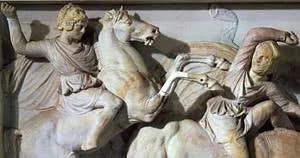Reincarnation in PARALLEL LIVES?
Spoiler alert: This blog reveals details of the plot of Parallel Lives.
The image above shows Alexander the Great in battle.
When Alexander Eastgard, the protagonist of Parallel Lives, is faced with a difficult, stressful, emotional situation, he experiences unusual sensations that may influence his behavior. In Chapter 1, Alexander “found it hard to believe that he could become so angry that he could summon the strength to knock down someone like Hector. It was almost like he had been someone else for those few insane seconds.” In the final lines of Parallel Lines, Alexander hears “a faraway roar of victory” that comes from within him.
There are many parallels between the lives of Alexander Eastgard and Alexander the Great. Alexander the Great’s parents were Philip, King of Macedonia, and Olympias; Alexander Eastgard’s parents are Philip and Olivia. Alexander the Great grew up in the Macedonian capital of Pella, while Alexander Eastgard’s childhood home is on Pella Street. Philip of Macedonia sustained an injury to his lower leg and lost an eye in war; Philip Eastgard injured his shin in war and lost an eye to melanoma.
When Alexander Eastgard learns that his father’s melanoma has spread and may lead to his death, he resorts to his go-to exercise, running, to diffuse the stress. This run becomes furious, an escape from reality, a brush with worlds that may belong to lives previously lived, but not to the actual life of 20th century Alexander Eastgard: “He soared along, imagining he was astride a powerful stallion, galloping with his companions down the banks of meandering Granicus, thundering up the other side, to access broad Sardis, across Gordian onto Issus, and then southwest onto a little dead-end street called Siwa; he turned around, retracing his path, and proceeded to Susa Street.” He runs on streets that in his mind have taken on the names of sites of battles fought by Alexander the Great, so that Alexander Eastgard seems to be glimpsing episodes from the life of Alexander the Great.
The run continues, and Alexander Eastgard “had never run like this. As he ran, palatial Victorian homes on their small lots merged into a towering walled city that he must circumnavigate, chasing a foe forever elusive,” reminiscent of Achilles chasing Hector around the great walled city of Troy. There are also many parallels between the lives of Achilles and Alexander Eastgard. Both are men of heroic beauty who are gifted runners. Achilles’ beloved companion is Patroklos, while Alexander Eastgard’s best friend is Patrick Close. Achilles and Alexander both have a nemesis named Hector. Achilles studied with Chiron the centaur, master of the medical arts, and was a skilled healer, while Alexander becomes a physician. A woman named Helen plays a critical role in the downfall of both Achilles and Alexander. Achilles died when struck by an arrow; Helen Fletcher brings tragedy into Alexander’s life. A fletcher is a maker of arrows. The ghost of Patroklos speaks to Achilles; on several occasions, Alexander thinks he hears Patrick’s voice after his death. Are these eerie coincidences? Or something more?
An explanation for these unusual aspects of Alexander’s life comes in Chapter 65, when Julia Kaiser consults a fortune-teller in Salem. The fortune-teller proves to be Alexander’s classmate Giulietta Stewart, whose romantic obsession with Alexander Eastgard has not diminished despite the passage of many years. Giulietta tells Julia that Alexander was “an old soul with a destiny greater than the life he has lived so far.” And that among his past lives are “Heroes out of legend. Great warriors, great explorers.” If we believe Giulietta, perhaps tenuous links to the past remain between Alexander Eastgard and his past lives, and in times of stress, the echoes of those past lives call out more strongly and drive his actions.
In conclusion, if the reader believes Giulietta, and incorporates the many parallels between the lives of Alexander Eastgard, and Alexander the Great and Achilles, the reader may conclude that Alexander Eastgard is a modern reincarnation of those two great warriors of the past. But Giulietta is my Cassandra, and like Cassandra, Giuli’s predictions are not taken seriously. I leave it to the reader to decide what it all means.

